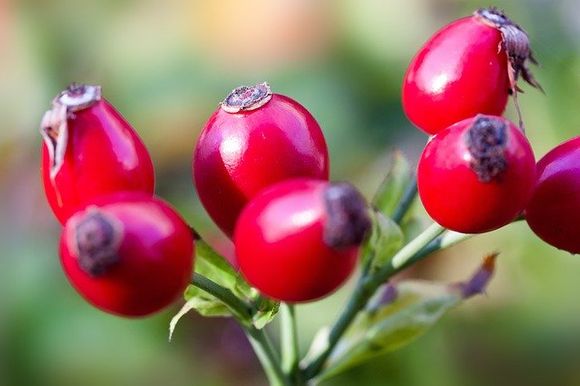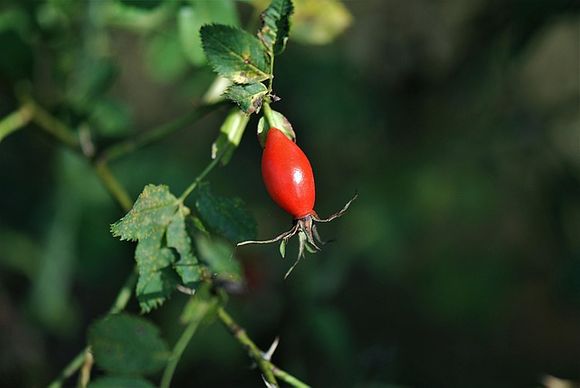Author: Yana Nencheva, Biochemist, PhD candidate in Biophysics
The Roman naturalist Pliny the Elder (1st century BC) names the rosehip "Dog Rose" because he believes that the root of the plant can cure the bite of a rabid dog. Hence the latin name of the plant - Rosa canina.
Hippocrates also discusses in his writings the benefits of rosehip, but the plant became really famous during World War II, when imports of fresh citrus fruits were stopped in the UK and the government organised grape picking and rosehip because of its rich vitamin C content. Vitamin C (ascorbate) deficiency poses a serious risk of developing scurvy, which, if left untreated, could even be fatal. Rosehip syrup is an old main source of ascorbic acid, which protected the population from scurvy [ref. 1].
Chemical composition of the rosehip
The biochemical composition of roehip depends on the environmental factors where the plant grows. A study on the nutrient composition of Rosa canina seed and oils was conducted in 2002. It makes a comparative analysis of the composition of rosehip fruits in Turkey growing in the regions of Khadim, Tashkent and Ermenek. It was found that the rosehip fruits from Ermenek contain the most iron [ref. 2].
Research worldwide has shown that increased consumption of plant foods that are rich in antioxidants (fruits, vegetables, nuts) reduces the risk of certain chronic diseases. Rosehip ranks among the first in antioxidant activity, along with walnuts (Juglans regia L.) [ref. 3].
Besides a high ascorbic acid content, the rosehip fruit also contains phenols, flavonoids, and possesses antimutagenic and anticarcinogenic activities [ref. 4].
Benefits of rosehip consumption
In addition to the fact that rosehip consumption protects against scurvy, we will look at another 9 great benefits of this marvelous herb.
1. Against diabetes mellitus

Amylase is an enzyme that is responsible for the degradation of starch to saccharides, which are then broken down to glucose. Therefore, pharmaceutical preparations have been developed that inhibit its action in diabetes. Studies have been conducted showing that the rosehip has an inhibitory (suppressive) effect against amylase and therefore supports its antidiabetic administration [ref. 4].
2. Boosts immunity
To check the benefits of rosehip for boosting immunity, the following study was conducted in 2011: standard healthy male rats were divided into three groups. The first (control) group was given saline for 4 consecutive weeks, the second - rosehip extract (250 mg/kg) and the third - twice the amount of rosehip extract (500 mg/kg).
Detailed blood tests were carried out at the end of each week, including immune markers. The result indicates rosehip can be safely used as a substance with an immunomodulatory effect [ref. 5]
Read more:
3. Against hyperuricemia - when there's too much uric acid in your blood

Hyperuricemia occurs when there's too much uric acid in your blood. This may be due to kidney or heart disease and diabetes. Increased uric acid levels may lead to the development of gout [ref. 6].
The rosehip fruit is used in traditional medicine to treat metabolic disorders, in particular - problems with urates. However, its effects on such disorders are not described in detail. Therefore, a study in 2017 carried out an experiment with mice, which showed that hot water rosehip extract can be used therapeutically in patients with a high level of urate, as well as in patients with hyperurecemia [ref. 7].
4. Stops diarrhea
In traditional medicine, rosehip leaf extract is used as a remedy against diarrhea. Therefore, a study was conducted with rodents, in which diarrhea was first induced with the intake of castor oil, and then given rosehip extract to test whether it would stop diarrhea.
A dose-dependent decrease in gastrointestinal transit has been observed. The researchers concluded that the presence of some phytochemicals in the rosehip leaf extract may be the cause of the observed effects and its use in traditional medicine as a remedy for diarrhea [ref. 8].
Read more:
5. Anticancer activity of rosehip
It is believed that rosehip has an antitumor effect, and since it is a rich source of vitamin C and polyphenols, it is studied whether fractions containing these two substances inhibit the growth of cancer cells. The fraction with vitamin C did not inhibit the growth of tested tumor cells, unlike polyphenols, which seem to contribute to the herb's antiproliferative activity [ref. 9].
Read more:
Parsley, celery and other herbs that help fight cancer
What are the causes of enlarged prostate and is there treatment with herbs
6. The common cold

The effect of vitamin C on the common cold is the subject of a lot of studies and the truth is that the results are fluctuating and do not unequivocally support the thesis that the cold passes faster because of the additional intake of vitamin C.
However, experience has shown that vitamin C relieves symptoms. The biochemical explanation for the benefits may be based on its antioxidant action. During an infection, phagocytes are activated and produce oxidizing compounds that are the cause of inflammation. This is a natural reaction of the immune response, which is sometimes undesirable. Reacting with these oxidizers, vitamin C can reduce the inflammatory effects and make you feel better [ref. 10].
7. Helps relieve symptoms of respiratory infections
57 elderly patients with acute respiratory infections (bronchitis and bronchopneumonia) were involved in a study with vitamin C supplementation (200 mg per day). Some of them got a placebo pill and the others received vitamin C. Their condition was reported before and after the intake.
The result is that oral intake of 200 mg of vitamin C per day results in a significant increase in the concentration of vitamin C in plasma, even in the presence of acute respiratory infection. Using a clinical evaluation system based on the underlying symptoms of the respiratory condition, patients who were taking vitamin C felt significantly better than those with the placebo sample.
This was particularly true for the severe cases and fot thse who had very low concentrations of vitamin C in plasma before the treatmment. Therefore, this type of research continues, discussing various mechanisms by which vitamin C can be beneficial [ref. 11].
Read more:
8. Cardiovascular health

It is considered that the role of antioxidants in the prevention of cardiovascular disease is key, but the evidence for the help of vitamin C in this regard is hesitant.
Two reports from 1998 support the role of vitamin C:
- The first study was a 5-year study in Finland. It suggests that people with vitamin C deficiency may be at increased risk of myocardial infarction.
- The second study suggests that vitamin C may play a role in preventing coronary artery disease, but not the progression of the disease.
These results provide a boost for further studies [ref. 12].
9. Depression and psychological disorders
In 1978, the level of vitamin C in the blood was studied in 125 patients with psychosis. These patients had a deficiency of vitamin C, which does not disappear during treatment, so the author of the analysis then recommended the use of vitamin C in doses of no less than 500 mg daily [ref. 13].
In 2014, another scientific paper on depression was published. It turned out that patients with biochemically depleted vitamin C had significantly stronger symptoms of depression. It was concluded that a large proportion of adult patients with depression had more pronounced symptoms due to a decreased amount of vitamin C [ref. 14].
Read more:
How to help your child with anxiety
7 practical tips on how to take care of our personal well-being during the emergency
How to consume rosehip

Although rosehip has, as we have listed, numerous health benefits, it is not a panacea, and if it is taken for the purpose of treating any particular disease, then this should be synchronized with your physician. Its rich biochemical composition goes hand in hand with contraindications for people who, for example, have problems with bile, blood clotting and heart.
However, if you want to consume rosehip for pleasure and prevention - tea and syrup are your options. Research supports traditional rosehip consumption [ref.15]. However, with marmalade/rosehip jam, you should be aware that the stomach and intestines may become irritated and swollen. In any case, do not consume it on an empty stomach. The increased content of ascorbic acid can irritate the entire gastrointestinal tract, especially if you have gastritis.
Read more:
7 more groups of diseases that honey cures
Food for good children's mental development since conception
The 10 most medicinal herbs that can be found in our country









